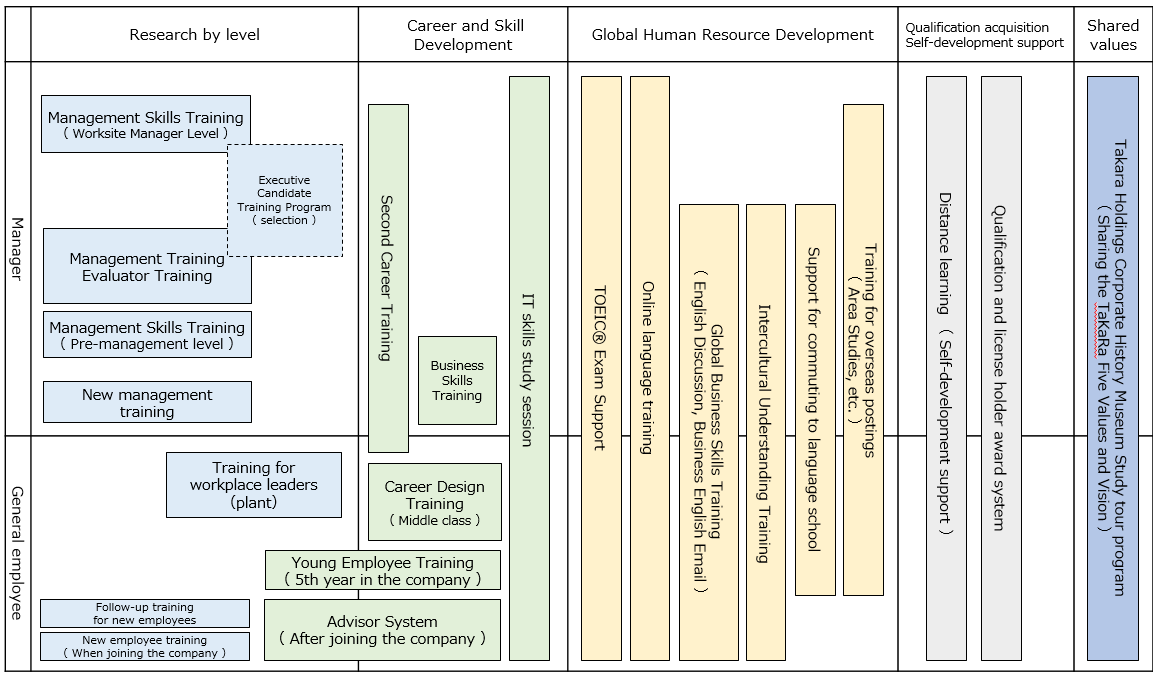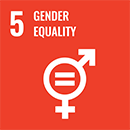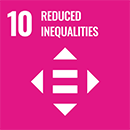Human Resources
The Takara Group Human Resources Policy
In the Takara Group, we take the perspective that personnel are crucial business assets and view them as valuable human resources.
Because we believe that a company is an organization comprising all of its individual employees and that the collective power of those human resources is the source of a company’s sustainable growth and development, we also believe that maximizing the potential of individuals and organizations by investing in our human resources is indispensable for further increasing corporate value and achieving Group growth.
Along with establishing a workplace offering both rewarding work and job satisfaction as well as a corporate culture that nourishes people, we are successfully fostering human resources who can be responsible for the next generation of the Group and take charge of global business growth as well as promoting the active involvement of diverse human resources.
Targets
| Initiative themes | Specific measures | Targets |
|---|---|---|
| Fostering human resources | Implement measures to foster human resources who will be responsible for the next generation |
[ Entire Group ] Use executive candidate development training and next-generational leadership development training, etc., to foster human resources who can be responsible for the next generation of the Group. |
| Foster human resources who will achieve global business growth (global human resources) |
[ Entire Group ] Develop human resources capable of taking charge of global business growth by acquiring human resources through continuous career recruitment and job rotation, including the assignment of young employees to the Takara Shuzo International Group and overseas postings. |
|
| Foster human resources using Takara Holdings Corporate History Museum, our training facility |
[ Entire Group ] In order to share the Takara Five Values, common values across the group, continue holding the Takara Holdings Corporate History Observational Training Program for all Takara Group employees. |
|
| Promoting the active involvement of diverse human resources | Promoting the active involvement of female employees |
[ Entire Group ] - Increase the number of women in management positions. In Japan we will continue carrying out initiatives in accordance with our Female Participation Promotion Act action plan*. Three companies—Takara Holdings, Takara Shuzo, and Takara Shuzo International—will appoint at least 50 women to manager and assistant manager positions (which includes through mid-career hiring) from FY2021 to the end of FY2030 (a 128% or above increase from the 39 women in managerial positions as of April 1, 2021). - Provide job opportunities for people up to 70 years old through post-retirement reemployment. - Maintain a percentage of employees with disabilities equal to or more than the statutory required employment rate in Japan. - Utilize more mid-career hiring to acquire a more diverse workforce. *Source: Main targets in the Female Participation Promotion Act action plan from our major companies [Takara Holdings, Takara Shuzo, Takara Shuzo International] - Percentage of women among new-hire recruits in administrative and technology roles:40%+ - Percentage of women managers (by the end of FY2025):10%+ 【Takara Bio】 Percentage of women returning to work after maternity leave (1 year):50%(early return to work) |
| Promote the active involvement of senior human resources | ||
| Promote the hiring of people with disabilities | ||
| Achieving a comfortable workplace environment and a work-life balance | Ensure workplace safety and sanitation |
[ Entire Group ] - Reduce total working hours compared with FY2020 results. (Domestic Group Companies*) - Increase the percentage of paid leave taken (no. of days taken) compared with FY2020 results. (Domestic Group Companies) - Maintain a 100% reinstatement rate for employees who take childcare leave. (Domestic Group Companies) - Facilitate effective use of work-from-home system. |
| Comply with labor-related laws and regulations | ||
| Prevent long working hours | ||
| Promote diverse working styles |
- * Domestic Group Companies: Takara Holdings, Takara Shuzo, Takara Shuzo International, Takara Bio, Kawahigashi Shoji, Total Management Business, Takara Butsuryu System, TB, Takara Bussan, Luc Corporation, Tokyo Mutual Trading, Takara Supply Communications (Former Taihei Printing, and Former Takara Yoki)
Related SDGs
Initiatives
Fostering human resources
Implement measures to develop human resources for the next generation
Aiming to foster human resources who can be responsible for the next generation of the Group, Takara Holdings, Takara Shuzo, and Takara Shuzo International have been providing executive candidate development training for employees in managerial positions primarily in their forties and workplace leadership development training in factories. The Group will continue its efforts to train human resources that will support the Group into the future by expanding measures to develop human resources targeting particular ranks that need to be strengthened in order to achieve business growth, such as the training to strengthen management capabilities of managers and pre-management personnel conducted every year.
Developing human resources for global business growth
Takara Holdings, Takara Shuzo, and Takara Shuzo International aim to acquire human resources who will realize global business growth through continuous mid-career recruitment and new graduate recruitment. Our human resources development efforts center on training through job rotation, such as assignment of young employees to Takara Shuzo International Co., Ltd. and overseas posts. To provide them learning opportunities to acquire language skills necessary for global business, we support those who attend language schools, take online English lessons, etc. For those who are transferred to overseas positions, we offer a support program that helps them be mentally prepared to live abroad and learn the custom and lifestyle of the host country, in addition to supporting them with language skills acquisition. As measures to support employees’ independent learning, we allow them to take multiple correspondence courses related to language learning, provide opportunities for all employees to take the TOEIC® tests by group application, and regularly hold Global Café, an exchange program between employees working in Japan and overseas Group employees. Through these and other measures, we are fostering a corporate culture that actively promotes global business development.
Foster human resources using Takara Holdings Corporate History Museum, our training facility
-
In March 2017, we opened the Takara Holdings Corporate History Museum, a training facility for Group employees inside and outside Japan, in Takenaka-cho, Fushimi-ku, Kyoto, which is where the company was established, as one of our 90th anniversary projects. The business territory of the Takara Group, which originated in the sake brewing business in 1842, has now expanded to include the Biomedical Business and the Japanese Food Wholesale Business in overseas markets. In terms of geographical regions, we have also actively extended our business activities in Europe, the U.S., Asia, and Oceania, resulting in diverse human resources. We utilize this facility for our Corporate History Museum Observational Training Program for all Takara Group employees in order to unite the Group as a whole and instill a mindset that is willing to take on challenges within the Group, and instill the Group’s common values, the “TaKaRa Five Values.”. In fiscal year 2022, 496 employees participated in the program, bringing the total number of participants since fiscal year 2017 to 3,474. It will continue to facilitate our efforts to foster a culture for promoting improvement in corporate value as we train the human resources that will support the Group into the future.
-

Takara Holdings Corporate History Museum
〇Human Resource Development and Training System

Promoting the active involvement of diverse human resources
Promoting the active involvement of female employees
The Takara Group is moving forward with initiatives in every group company in line with an action plan that is based on the Act on Promotion of Women’s Participation and Advancement in the Workplace to further promote the advancement of female employees’ careers. Takara Holdings, Takara Shuzo, and Takara Shuzo International conduct training programs for mid-level employees, including women, with the aim of supporting their career development while balancing work and life events. In addition, training is provided for managers who supervise female employees, to help create a work environment in which women can be more motivated and engaged. We also hold roundtable discussions between female employees and female managers, designed to offer insights and inspiration for employees in planning their own careers. The companies plan to newly appoint at least 50 women to manager and assistant manager positions by fiscal year 2030 as a mid- to long-term target. As of April 2025, a total of 44 women have been appointed. The proportion of women in managerial positions was 10.2% as of April 2025, exceeding the companies’ target of achieving at least 10% by the end of fiscal year 2025.
>Click here for information on Takara Holdings' initiatives.(Japanese only)
>Click here for information on Takara Shuzo' initiatives.(Japanese only)
>Click here for information on Takara Bio' initiatives.(Japanese only)
Promote the active involvement of senior human resources
At Takara Holdings, Takara Shuzo, Takara Shuzo International, and Takara Bio, we have created an environment where all employees who wish to continue working after the mandatory retirement age of 60 can do so until the age of 65 through our post-retirement re-employment system. The percentage of employees rehired after retirement is 77% for Takara Holdings, Takara Shuzo, and Takara Shuzo International combined over the past three years (FY2021-FY2023), and 86% for Takara Bio. As part of measures to ensure employment opportunities until the age of 70, Takara Holdings, Takara Shuzo, and Takara Shuzo International introduced a system of continued employment until the age of 70 in October 2022, and Takara Bio introduced a system in April 2023.
Promote the hiring of people with disabilities
When hiring people with disabilities, we ensure that our workplaces are conducive to allowing these individuals to exercise their talents. Approaches to doing so include understanding the individual’s work skills, establishing and developing a range of work tasks suited to the person’s circumstances, and improving the workplace environment. Additionally, people with disabilities participate in professional work alongside able bodied employees as we strive to create an environment in which they will feel a sense of purpose in their job. As of April 1, 2024, Takara Holdings employed 10 persons with disabilities (7 persons legally employed, 3.12% employment rate), Takara Shuzo 37 persons (29 persons legally employed, 2.92% employment rate), and Takara Bio 21 persons (20 persons legally employed, 2.56% employment rate).
Creating a Comfortable Workplace and Work-Life Balance
Monitoring and Supervising Health and Safety
The Takara Group strives to maintain and improve a safe and hygienic work environment, aiming for zero workplace accidents while complying with all relevant safety and health regulations. In the event of an occupational accident, we promptly identify the cause and implement necessary measures such as equipment improvements and safety training.
Information on any accidents is shared at the monthly Occupational Safety and Health Promotion Meeting to ensure company-wide awareness and horizontal deployment of preventive measures. We also take immediate action, including preparing reports and submitting required notifications, in accordance with prescribed procedures. To prevent accidents before they occur, we conduct regular workplace inspections by occupational physicians and other initiatives to ensure safety and peace of mind. In addition, safety training for employees at manufacturing plants is provided as needed.
Workplace Safety and Employee Health Promotion
As part of our commitment to maintaining and improving employee health, we conduct legally mandated health checkups and annual stress checks. Employees identified as having high stress levels and who request support are offered consultations with an occupational physician. If work-related measures are deemed necessary, we implement them accordingly to help prevent mental health issues before they arise.
In addition, we analyze stress check results at the organizational level to monitor workplace stress conditions and take steps to improve the work environment where needed. Moving forward, we will continue working closely with occupational physicians and the Takara Group Health Insurance Association to reduce health risks and promote employee well-being.
Comply with labor-related laws and regulations
The Takara Group operates globally and is committed to maintaining a comfortable and safe working environment while complying with local labor laws and regulations in each country and region where we conduct business. We strictly prohibit excessive working hours, forced overtime, and any form of compulsory labor, in accordance with labor standards laws, and require managers to pay close attention to the physical and mental well-being of their team members. Furthermore, all recruitment activities in each country are conducted in compliance with local laws. To prevent child labor and forced labor, we ensure thorough age verification during the hiring process and strictly adhere to statutory minimum wage requirements.
Prevent long working hours
From the perspective of preventing health problems caused by long working hours, we have a system in place that prohibits overtime work in excess of 60 hours per month and work on Sundays as a general rule, and ensures that managers thoroughly manage overtime hours, as well as a system in which the person in charge of management at each workplace and the human resources department also check progress in the middle of the month . Under the Article 36 Agreement, we limit the maximum extended working hours to 75 hours per month. We also ensure that the total hours of overtime work and work on holidays in excess of 40 hours a week do not exceed 80 hours a month, in an effort to reduce excessive working hours.
Health management for employees posted overseas
For employees posted overseas, we require them to undergo a medical examination before they leave for their new post and again when they return, and in principle we also arrange for them to have an annual medical examination after they have arrived at their new post. In addition, if they need to receive vaccinations for tetanus, rabies, etc. when they are posted to an Asian country, we will pay for them.
Sound labor-management relations
Takara Holdings has built a sound labor-management relationship with the TaKaRa Labor Union, founded on mutual trust between employees and management. We regularly provide reports on business management and discuss labor conditions at meetings of the Labor-Management Council and various special committees on labor-management relations.
Promote diverse working styles
As part of efforts to support the balance between work and family life, Takara Holdings, Takara Shuzo, and Takara Shuzo International have expanded their telecommuting system, which was previously limited to those engaged in childcare or nursing care, to cover all employees except those who are required to come into the office for work, such as factory workers. In order to promote diverse working styles, the system has been expanded to allow employees to take annual paid leave on telecommuting days in hourly increments in addition to half-day increments. In addition, from April 2024, the requirements for taking accumulated paid leave have been expanded as a mechanism to support employees in balancing work and infertility treatment, and accumulated paid leave can now be taken in half-day increments.
Promoting the utilization of childcare leave by male employees
Each of the Takara Group companies is making efforts in line with an action plan based on the Act on Advancement of Measures to Support Raising Next-Generation Children. Takara Holdings, Takara Shuzo, and Takara Shuzo International are working to maintain and improve the level of childcare leave utilization, with the targets of “100% of employees returning from childcare leave” and “30% or more of male employees taking childcare leave.”
In fiscal year 2024, the percentage of male employees taking childcare leave was 84.6%, as a result of efforts to create an environment that makes it easier for male employees to take childcare leave, such as by individually informing male employees about the leave, holding individual interviews with them to confirm their intentions at an early timing, and following up after the interviews, as well as the establishment of a company-wide consultation desk within the Personnel Division.
>Click here for information on Takara Holdings' initiatives.(Japanese only)
>Click here for information on Takara Shuzo' initiatives.(Japanese only)
Improving employee engagement
Understanding the current state through engagement survey and efforts towards improvement
To realize Takara Group’s Vision, we need each and every employee to understand and sympathize with the goals and vision of the organization and to encourage them to voluntarily demonstrate their capabilities while bringing their diverse strengths together, and thereby maximize our ability to get things done as an organization. Recognizing that we cannot improve productivity or generate innovation without fostering a sense of satisfaction among our employees such as by improving their engagement, we have been conducting an employee engagement survey since fiscal year 2022, and the survey was conducted for the second time in fiscal year 2024. In conducting the survey, in order to more accurately grasp the situation of the Company, we designed our own survey with the cooperation of external experts, using five indicators: “Company,” “Workplace,” “Supervisor,” “Job,” and “Systems.” We share the issues identified in the analysis of the survey with all our employees, including executives, and work to further improve employee engagement through initiatives under the company-wide project to reform our corporate culture and by strengthening career development support programs.




